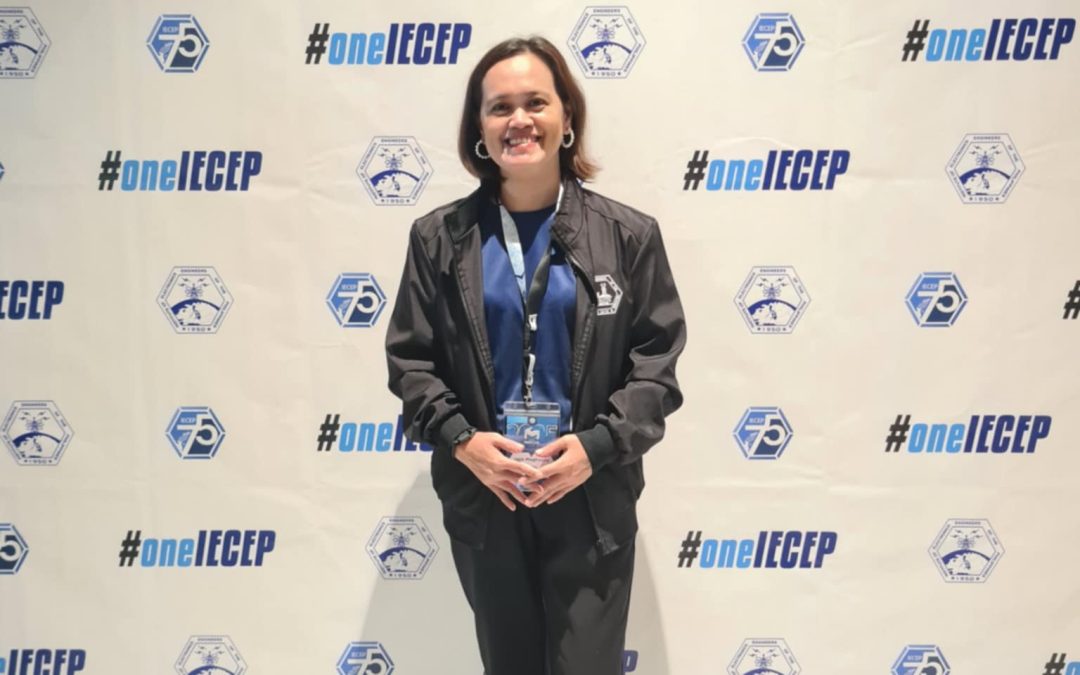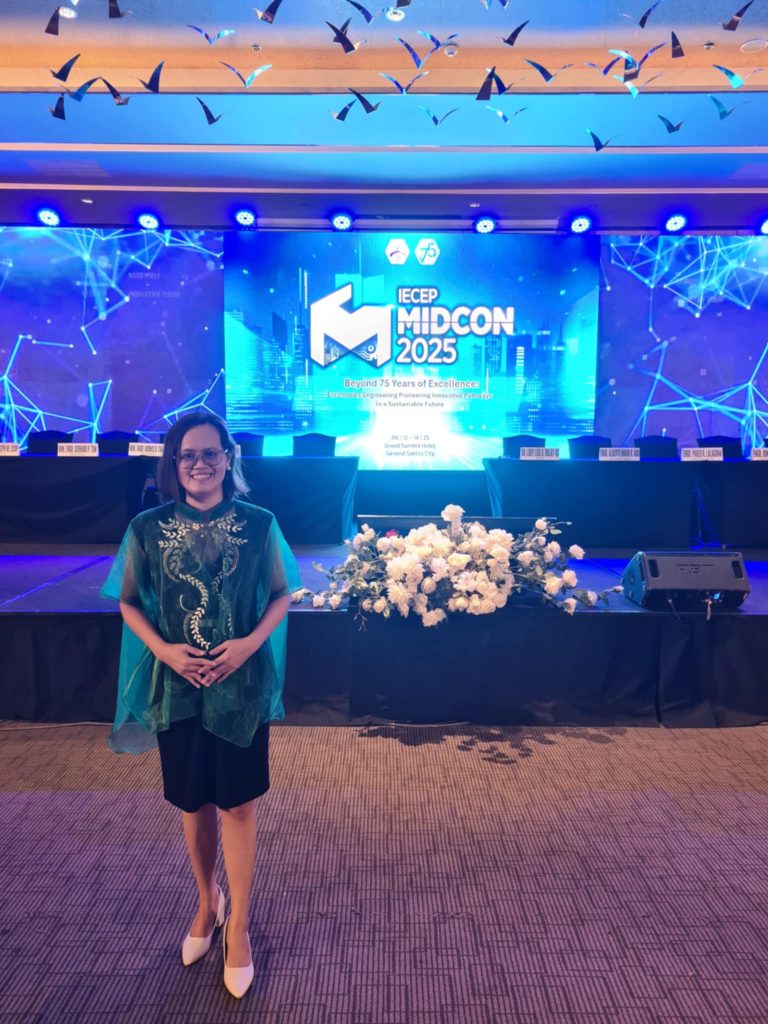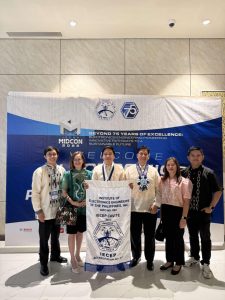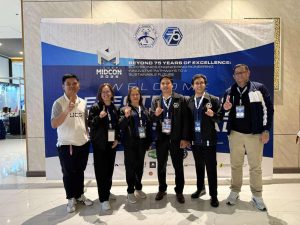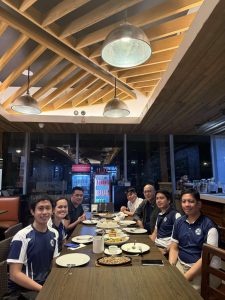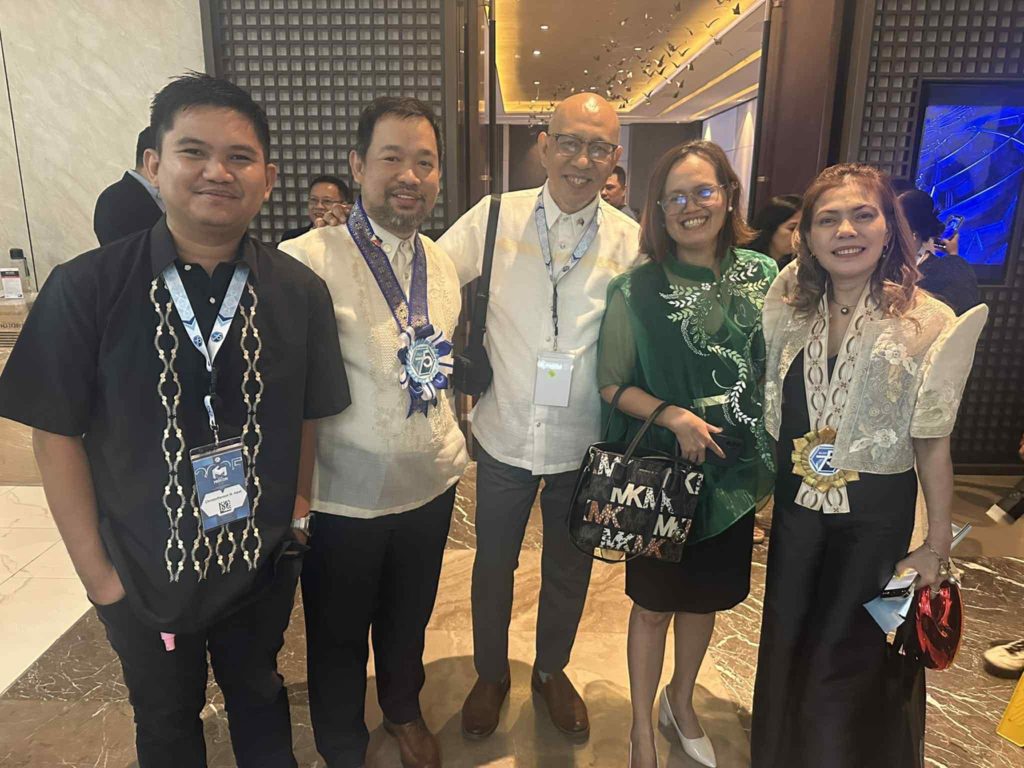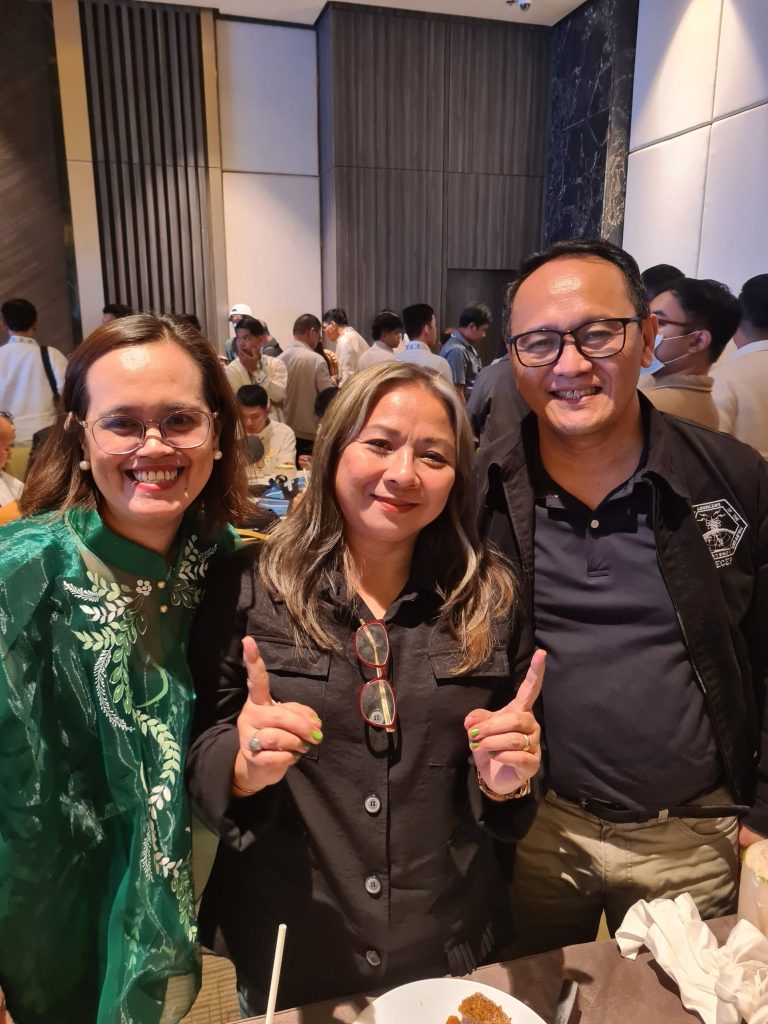I used to think, “IECEP? That’s for the active ones—the ones who stayed on the traditional engineering path.”
After my corporate career as a Telecom Fraud & Risk Specialist, I went in a completely different direction. For the last 17 years, I’ve been immersed in the digital world—freelancing, consulting, and working with MSMEs. Along the way, I let go of my PRC license. I wasn’t part of any IECEP chapter. Honestly, I felt like I had stepped away from the profession entirely.
But during the pandemic, something quietly shifted. I started helping the IECEP Cavite Chapter—nothing big, just remote support, behind-the-scenes. It was light, manageable, and surprisingly meaningful. It offered me a window back into the community I thought I had left behind.
Then, as the world began to move forward, I stepped back again.
It wasn’t until 2024 that I returned with intention—not just as a quiet contributor, but as an officer of the IECEP Cavite Chapter.
That journey came full circle when I attended the 75th IECEP National Midyear Convention this June 2025, held at the Grand Summit Hotel in General Santos City.
With the theme “Beyond 75 Years of Excellence: Electronics Engineering Pioneering Innovative Pathways to a Sustainable Future,” the convention wasn’t just a celebration of the profession’s legacy—it was a reminder that no matter how far you think you’ve wandered, there’s always a way back to where you started.
IECEP Cavite Chapter
After years of working independently and mostly online, finally having two full days of face-to-face interaction was a breath of fresh air. Meeting fellow officers in person brought a different kind of energy to everything we do.
The conversations felt more real, the ideas flowed more easily, and the sense of teamwork felt stronger than anything I’d experienced virtually. It reminded me that beyond the roles and responsibilities, it’s the genuine connections that keep the organization alive and thriving.
Reconnections That Sparked Something Deeper
I expected the convention to be technical, maybe a little stiff or overwhelming. What I didn’t expect was the warm sense of coming home—even after being away for so long.
One moment that really hit me was seeing my college instructor again after 25 years. She’s now the national president of IECEP! I felt so proud—it reminded me how far we can go in this field.
I reconnected with a colleague from my internship days at Maratel (now PLDT).
And unexpectedly, a fellow MSU-IIT schoolmate recognized me—it was a short exchange, but it meant a lot.
These weren’t just coincidences. They were gentle reminders that the ECE community is still alive, still connected—even if we’ve taken different paths.
Key Takeaways from the Learning Sessions
Aside from the meaningful conversations and reconnecting with peers, one of the things I really appreciated about the convention was the lineup of learning sessions. The topics were timely, relevant, and honestly, eye-opening. From national cybersecurity to new developments in engineering, each session offered something valuable. It reminded me how much the field continues to grow—and how important it is for us to keep learning and adapting, especially in today’s fast-moving digital world.
National Cybersecurity Plan 2023–2028
The session highlighted the mandate of RA 10844 in establishing the National CERT and introduced the key priorities of the 2023–2028 plan. Emphasis was placed on strengthening national cybersecurity capabilities and promoting widespread awareness across sectors.
A Trusted, Secure, and Reliable Cyberspace for Every Filipino
The plan envisions a digital Philippines where cyberspace is:
Trusted – A foundation for safe digital transactions, e-commerce, and online services.
Secure – Equipped to defend against cyber threats and safeguard national interests.
Reliable – Functioning consistently and dependably for all users.
The DICT outlined three strategic outcomes:
The State and its people are proactively protected in cyberspace
– Key actions include securing the government’s digital infrastructure (GovNet), establishing a National Security Operations Center (NSOC), and enhancing the National CERT (NCERT) to improve cyber incident response and monitoring.
Cybersecurity workforce capabilities are increased
– Through revitalized training via the ICT Academy, the creation of a Cybersecurity Center of Excellence, and a nationwide awareness campaign every October, the plan aims to upskill more professionals and strengthen human capital.
Cybersecurity policy framework is strengthened
– DICT is pushing for the implementation of minimum cybersecurity standards, the adoption of secure protocols (like SSL, TLS, PKI), and inter-agency collaboration with DOST, DTI, and the private sector to align with international standards.
This framework signals a stronger, more resilient digital environment that’s not just protective—but empowering, especially for sectors like education, business, and local government.
The Future of Broadcasting: Innovation and Sustainability in Media Technologies
Broadcasting systems were broken down into three segments: Acquisition, Production, and Distribution. Cloud-based infrastructure (SaaS, PaaS, IaaS) was identified as a sustainable and scalable alternative to traditional broadcast systems. The discussion included the rise of OTT platforms like Netflix and Prime, showing the industry’s shift toward digital convergence.
Updates on the Philippine Electronics Code and Tariff Regulations for ECE Professionals
The session detailed the role of the Philippine Electronics Code in ensuring safety, reliability, and compliance with international standards (ISO/IEC and ITU). It was emphasized that only licensed PECEs are authorized to design and certify electronic systems. Legal and ethical boundaries were clarified, particularly under RA 9292.
Sustainable Electronics Design and Innovation: Electronics Product Development
Key design elements such as SolderMask, Silkscreen, and efficient PCB layout were introduced. The discussion underscored the importance of Electromagnetic Compatibility (EMC) and the Restriction of Hazardous Substances (RoHS) in developing sustainable electronics that meet environmental and safety standards.
INCOSE Primer: Innovating Engineering Practices through Sustainable Methodology
Systems Engineering was presented as a structured, life cycle–based approach to solving complex challenges. The session emphasized the role of systems thinking, interdisciplinary collaboration, and the importance of adopting global best practices such as INCOSE certification and digital transformation frameworks.
Managing Complex Engineering Projects for a Sustainable Future
This session offered practical project management insights, including the use of a Master Programme to track deliverables, client alignment, and status. Concepts like the hierarchy of controls in safety and iterative risk identification were emphasized as essential components of sustainable project execution.
Securing the Digital Landscape: A New Wave of Cyber Threats and Defenses
Critical threats such as ransomware and vulnerabilities in cloud infrastructure were discussed. Key defenses—including firewalls, encryption, and regular backups—were stressed, along with the need for organization-wide cybersecurity awareness and best practices.
Day 1 delivered a comprehensive blend of public policy, digital transformation, global standards, and sustainability in electronics engineering. The sessions collectively reinforced the relevance of the ECE profession in nation-building, innovation, and protecting the digital future of the Philippines.
Day 2 Learning Session
Sessions That Resonated With Me
There were many valuable insights during the two-day IECEP National Midyear Convention, but a few sessions really stood out to me—because they spoke directly to what I do and what I care about most.
The session on Sustainable Digital Transformation: The Role of ICT and Computers hit home. This is the space I’ve been in for years—helping MSMEs adopt digital tools and embrace technology to improve how they work. I’ve seen firsthand how going digital can help businesses not just survive, but grow. But what truly resonated was the deeper impact: when MSMEs go digital, they’re also helping build a more inclusive, sustainable society. That’s the kind of change I want to be part of.
I also found myself drawn to the session on Sustainable Electronics Design and Innovation: Electronics Product Development. It reminded me that innovation in electronics isn’t just about what’s new or fast—it’s about being intentional. In my work of connecting Filipino electronics engineers to global opportunities, I started thinking more deeply: how can we design products that are not only competitive, but also kinder to the environment?
The topic on Securing the Digital Landscape: A New Wave of Cyber Threats and Defenses also made me pause. As we push for digital adoption, we can’t ignore the growing risks online. Many MSMEs don’t have access to strong cybersecurity tools, and this session reminded me that security needs to be part of the digital transformation conversation—not an afterthought.
And then there was the INCOSE Primer: Innovating Engineering Practices through Sustainable Methodology. This was my first time hearing about INCOSE, and it really made me reflect on how systems and products are designed. It encouraged me to think beyond short-term fixes and look at sustainability as a core engineering mindset—something we all need to apply, especially in fast-paced fields like outsourcing and electronics. It left me inspired to learn more and to keep aligning my work with purpose-driven, sustainable impact.
Kapehan with the ECE Board
Another moment that caught my attention—though only briefly—was during a Kapehan with the ECE Board, where the Magna Carta for ICT Workers was mentioned. I only had a short glimpse of the discussion, but it immediately sparked my curiosity. This proposed policy aims to uplift and protect ICT workers, and it’s currently open for public feedback.
As someone who has built a career in freelancing and remote digital work, I couldn’t help but wonder: Does this policy include us—those of us working outside traditional employment setups? I believe many in our industry aren’t even fully aware of conversations like this, much less how policies might affect or exclude them.
To my fellow ECE freelancers and digital professionals: This is our chance to be seen and heard. Even if we’ve only caught snippets, let’s take the time to review the draft, share our stories, and ensure our voices are reflected in the Magna Carta for ICT Workers. We are part of the ICT landscape—and it’s time we’re acknowledged as such.
ECEs Beyond the License—Your Role Matters
If you’ve drifted away from the profession—maybe because you changed careers, didn’t renew your license, or just felt out of place—I understand.
But I want to remind you: you still belong here.
Whether you’re in ICT, freelancing, education, tech startups, or even running your own business—you bring something valuable to the table. Your training, your way of thinking, your unique problem-solving mindset as an engineer—it still matters, even outside the traditional practice.
You don’t need a lab coat or a freshly renewed PRC license to make an impact. Showing up, learning, reconnecting—that’s already a powerful step forward.
This journey we’re on as ECEs isn’t always linear. Some paths take us away from the board exams, from design tables, or from technical certifications. But it doesn’t take us away from the heart of what being an engineer means: solving real problems, creating meaningful solutions, and building a better future.
You are part of this profession—no matter where you are in your journey.
Why This Moment Mattered to Me
Saying yes to becoming a chapter officer was one thing—but attending the national convention was something else entirely. It definitely took me out of my comfort zone.
There were moments that felt unfamiliar, even a bit awkward—things I wasn’t used to or didn’t expect. But stepping into that space turned out to be exactly what I needed. It stretched me, challenged me, and reminded me that even if I’ve taken a different path, there’s still a place for me here.
What I found at the IECEP National Convention wasn’t just an event—it was a personal rediscovery.
I realized that even after years away from the formal practice, I’m still deeply aligned with the ECE profession, especially through ICT and Computer Systems. As an ICT advocate helping MSMEs embrace digital transformation, I now see that the engineering mindset I developed years ago is still the compass that guides me.
This experience reminded me that IECEP is more than CPD points or license renewals. It’s a platform for professional relevance, connection, and nation-building.
In a time where technology shapes every part of our lives—from smart cities to small online businesses—we, as ECEs, are needed more than ever. Whether we work in tech, education, freelancing, or enterprise, we are part of this evolving story.
As the IECEP Hymn proudly declares:
“ECEs, let’s build the nation!”
“One organization, our many chapters, our one profession.
Walking hand-in-hand in the same direction…
With the help above we’ll do our mission!”
And that mission—para sa bayan—is why I’m showing up again.
For the profession.
For innovation.
For the community.
For the future.

